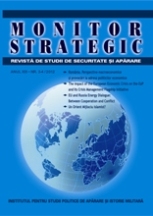Strategia Statelor Unite pentru Orientul Mijlociu Extins: critici ale abordării neoconservatoare şi limitele teoriei păcii democratice
The United States Strategy for the Broader Middle East: Critics of the Neo-Conservatism and the Limits of the Democratic Peace Theory
Author(s): Mihaela MateiSubject(s): Government/Political systems, International relations/trade, Security and defense, EU-Approach / EU-Accession / EU-Development, Globalization, Peace and Conflict Studies
Published by: Editura Militară
Keywords: Democratic Peace Theory; The United States Strategy;
Summary/Abstract: The paper focuses on analyzing the Broader Middle East and North Africa (BMENA) strategy and its influence over the international agenda in the recent years and international institutions related to the new perspectives over the Middle East. This influence generated new efforts towards cooperation between NATO and EU, on one hand, and the states from the BMENA region (see, for instance the Mediterranean Dialogue, European Neighborhood Policy and Istanbul Cooperation Initiative). Despite the fact that pragmatic positive effects are difficult to assess, the BMENA project have created new frameworks for inter-regional cooperation and development of diplomatic contacts. The BMENA strategy is analyzed from the United States perspective regarding two conceptual elements> the democratic peace theory and the Karl Deutsch’s theory regarding the security communities. In addition to those theoretical elements, the issue of the globalization’s effects over state transformations is also debated. The study also presents the neo-liberal critics regarding the BMENA strategy (namely the paradoxes and the multiple aspects of the process of democratization), as well as the role of morality in foreign policy and the so-called errors of neo-conservatism.
Journal: Monitor Strategic
- Issue Year: 2007
- Issue No: 3-4
- Page Range: 41-53
- Page Count: 13
- Language: Romanian

